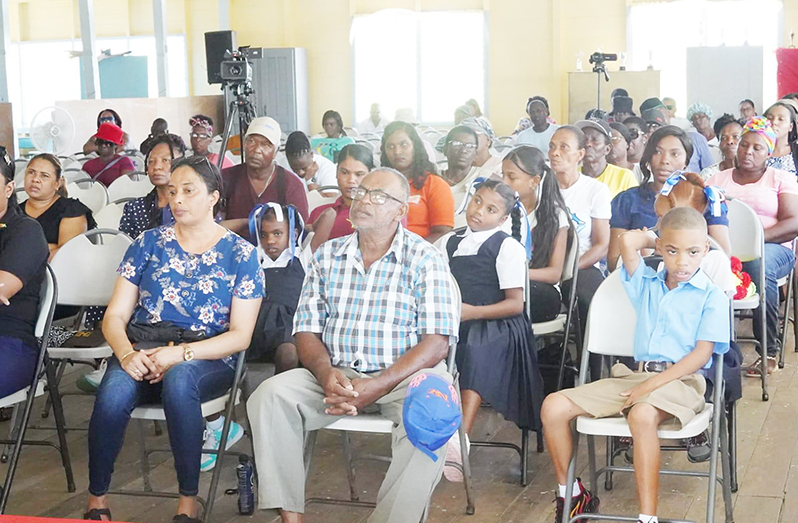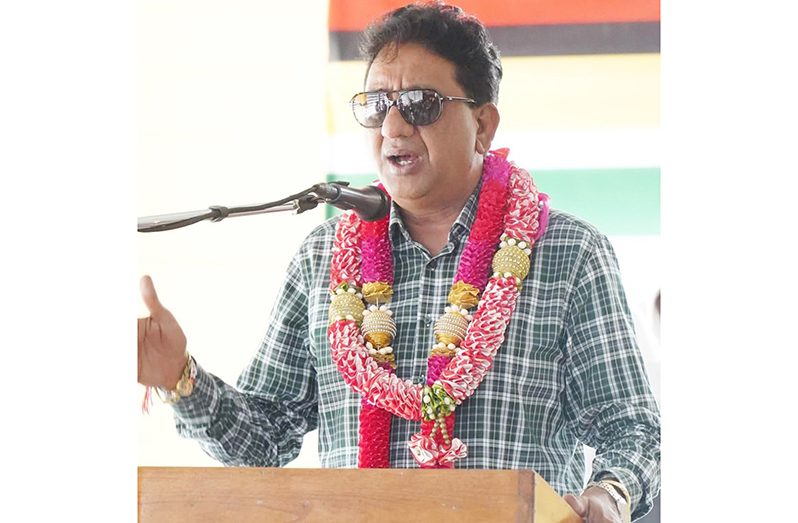…as land regularisation process begins
ATTORNEY General and Minister of Legal Affairs Anil Nandlall, SC, along with a team from the Guyana Lands and Surveys Commission (GLSC), led a comprehensive land regularisation exercise at No. 51 Village, also known as Leeds, Region Six (East Berbice-Corentyne), on Saturday.
Seen as a significant step towards resolving long-standing land issues and promoting equitable land ownership, this initiative aims to provide residents with answers and clarity about land ownership issues that have persisted for decades, originating with the end of slavery.
Over the next three months, surveyors from the GLSC will conduct an occupational survey to demarcate individual land parcels for some 300 residents.
Scores of persons gathered at the Leeds Primary School where they interacted with Nandlall; Regional Chairman David Armogan; Rene Duesbury, Deputy Commissioner at GLSC and other officials.
In his opening remarks, Nandlall highlighted the government’s commitment to addressing land issues countrywide as part of a broader national agenda to ensure fair and equitable access to land for all citizens.
He noted the importance of land ownership in empowering individuals and communities, adding that securing Certificates of Titles can lead to economic stability and the ability to pass on assets to future generations. The Attorney General highlighted the benefits of having a land title document, including the ability to secure loans from commercial banks.
“One of the greatest forms of empowerment, other than education, is title to land. This process is what real empowerment is. It is that title that certifies according to the laws of this country, that you own this property definitively and conclusively. That is the document that the commercial banks will accept without question when you go to borrow money. No human being will lend you money unless they feel you are good for it. And if they feel you are good, they want collateral…” he explained.

According to him, title documents provide legal certainty when compared to transports and can increase the value of property.
A transport, he emphasised, can be terminated if someone occupies the land for over a decade, but a Certificate of Title can only be set aside on the ground of fraud in a court of law.
Nandlall added: “But not only is it about an effective system administratively. So, if you want to pass your title to someone else, you get it done in quicker time than if it was a transport. The title itself is a document that is a greater strength, legal strength, than the transport. The title itself has many characteristics which the transport doesn’t have…”
Because “they [the foreparents] tell you to live on in,” he said that many people are living on land that was passed down to them without proper documentation.
“If you don’t have transport for the land, you are essentially squatting,” Nandlall stressed.
He gave some historical context for property ownership in Guyana, pointing out that the nation inherited, from colonialism, the Roman-Dutch system, which involves a drawn-out land transfer procedure. He said that Guyana replaced the Roman-Dutch system of land ownership in the 1960s with the land registration system in recognition of these difficulties.
However, the land registration system’s full implementation was delayed, and today, decades later, the disclosed that the government is aggressively working to finish the procedure.
According to him, the land registration system is more effective and provides stronger legal title.
He pointed out that instead of receiving transport, people living in the new housing development are receiving Certificates of Title. Almost 400 Certificates of Title have been distributed in the last year as a result of ongoing land regularisation efforts in several villages, including Cotton Tree, Numbers 1, 2, 3, 4, and 49 Villages, according to Nandlall.

Moreover, Nandlall told residents of Leeds that for the exercise to run smoothly, they need to cooperate. He said residents must provide names for the title documents and resolve any disputes with neighbours. He advised residents to appoint authorised agents if they are unable to participate in person. “The process, first of all, cannot be conducted and also completed without your participation. And I don’t want you to participate blindly in the process. I want you to understand the process in which you are going to be engaged and the benefits of that process and what the results of the process really are,” the Attorney General said to the residents.
“Some of you will have to move your fence. You will have to adjust where you are occupying,” said Nandlall, adding that the procedure entails resurveying the entire village in addition to carrying out an occupational survey. Residents expressed concerns over several issues like conflicting land rights and disputes regarding communal lands. The Attorney General stated that the land regularisation exercise is an initiative of President Dr Irfaan Ali and that the government is committed to funding it.
According to him, similar exercises will be conducted in other Region Six villages.
He also spoke on plans to expand to other areas in the future. He stated that the Ministry of Housing cannot complete the process on its own due to its magnitude, and as a result, support has been sought for the GLSC and the Deeds and Lands Registries.


.jpg)











